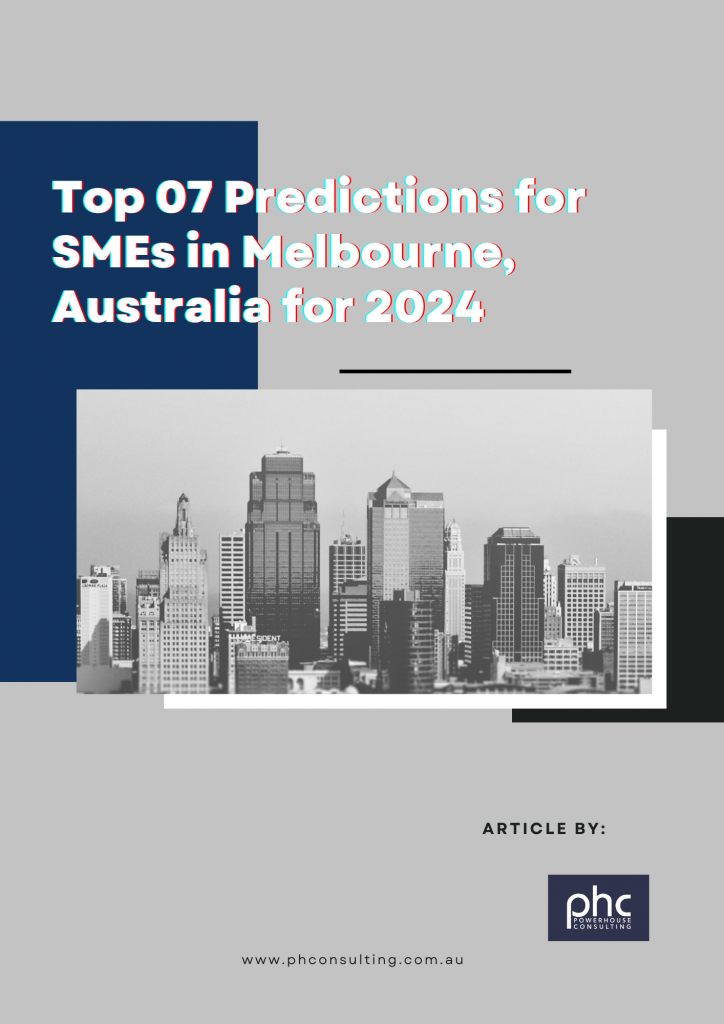
Introduction:
As we step into the year 2024, the business landscape for Small and Medium-sized Enterprises (SMEs) in Melbourne, Australia, is poised for both challenges and opportunities. The evolving global economy, technological advancements, and changing consumer behaviors continue to shape the way businesses operate. In this article, we will explore some key predictions for SMEs in Melbourne in 2024 and how they can position themselves for success.
1. Digital Transformation Acceleration:
In 2024, SMEs in Melbourne will witness a further acceleration of digital transformation. The ongoing global shift towards digitalization, intensified by the COVID-19 pandemic, will encourage businesses to invest in advanced technologies. Cloud computing, artificial intelligence, and data analytics will become integral for SMEs, enhancing operational efficiency, and enabling them to stay competitive in a rapidly evolving market.
2. Remote Work Evolution:
The trend of remote work, which gained prominence during the pandemic, will continue to evolve in 2024. SMEs in Melbourne will need to adopt flexible work policies and invest in technologies that support remote collaboration. This shift not only accommodates the changing expectations of the workforce but also opens up new possibilities for talent acquisition beyond geographical boundaries.
3. E-commerce Dominance:
The e-commerce boom is set to persist in 2024, with SMEs in Melbourne increasingly relying on online platforms to reach a broader audience. Businesses that invest in user-friendly websites, seamless payment systems, and effective digital marketing strategies will capitalize on the growing preference for online shopping. Moreover, embracing sustainable and ethical business practices will likely resonate well with environmentally conscious consumers.
4. Cybersecurity Prioritization:
As digital dependency grows, so does the threat of cyber-attacks. SMEs in Melbourne will prioritize cybersecurity measures to protect sensitive business data and customer information. Investing in robust cybersecurity infrastructure and providing ongoing employee training on cybersecurity best practices will be crucial for safeguarding against potential threats.
5. Focus on Sustainability:
SMEs in Melbourne will increasingly recognize the importance of sustainable business practices in 2024. Consumers are becoming more environmentally conscious, and businesses that adopt sustainable initiatives, such as reducing carbon footprints and embracing eco-friendly packaging, will gain a competitive edge. Additionally, there may be government incentives and regulations promoting sustainability that SMEs can leverage for both ethical and economic benefits.
6. Adaptation to Changing Consumer Behaviour:
Understanding and adapting to changing consumer behaviors will be vital for SMEs in 2024. The use of data analytics and market research will help businesses anticipate trends and tailor their products or services to meet evolving customer preferences. Personalization and customer-centric strategies will be key in retaining and attracting a loyal customer base.
7. Collaboration and Networking:
In a dynamic business environment, SMEs in Melbourne will find strength in collaboration. Networking with other businesses, both locally and globally, can open up new avenues for partnerships, shared resources, and mutual growth. Collaborative initiatives can range from joint marketing efforts to shared research and development projects.
Conclusion:
As SMEs in Melbourne embark on the journey into 2024, embracing change and staying agile will be paramount for success. Digital transformation, remote work adaptation, e-commerce dominance, cybersecurity, sustainability, consumer-centric approaches, and collaboration will shape the landscape for small and medium-sized enterprises. By staying attuned to these predictions and proactively adjusting their strategies, SMEs can navigate the challenges and thrive in the evolving business landscape of Melbourne, Australia.




